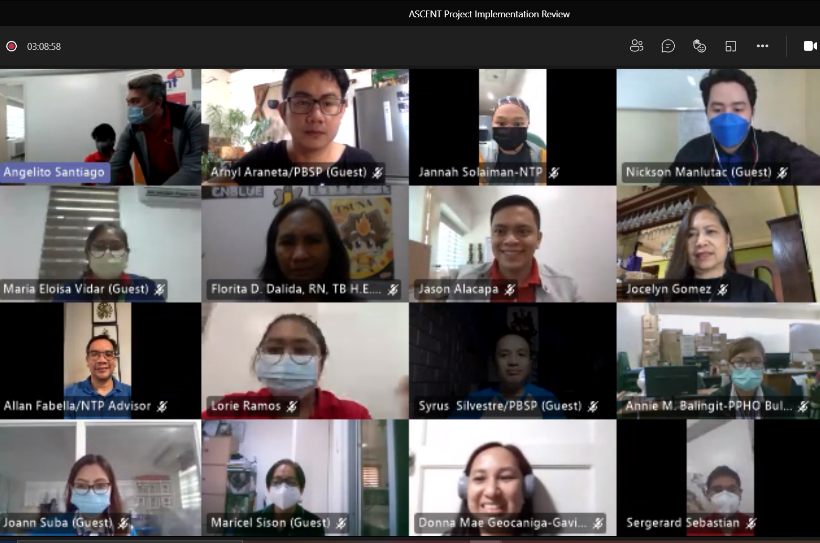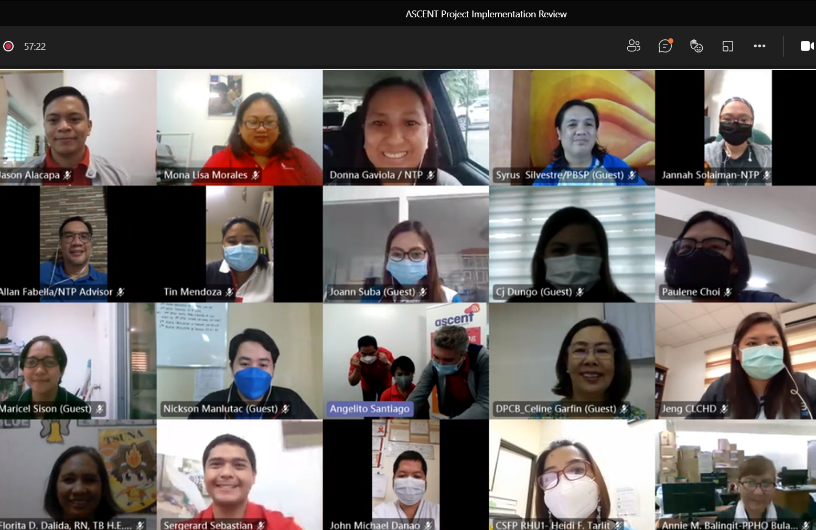ASCENT Checks on Progress in Using Digital Tools To Support TB Treatment in Bulacan and Pampanga
The ASCENT project recently looked into how 46 health facilities in Bulacan and Pampanga are using digital adherence tools (DATs) to support TB care for better treatment outcome. Held on 27 July 2021, the DAT implementation review highlighted the challenges in applying DATs and recommended steps to address them. Held on 27 July 2021, the review drew on the seven-month run-in phase carried out to prepare for the research part of the ASCENT project. Dr. Anna Marie Celina Garfin, the Department of Health National TB Control Program manager, pointed out the importance of the review as the country eyes the expansion of DAT use in the country. “The implementation review will help us determine which of the three DATs we’re currently using – medication sleeve/label, smart pillbox, and video-supported treatment – is the most patient-friendly and feasible to scale up,” she said. She thus urged the TB nurses participating in the review to “candidly share your experience in using DATs.”
Drawing on the presentations of Annie Mendoza and Nickson Manlutac, provincial TB coordinators for Bulacan and Pampanga, respectively, the review singled out the effects of the COVID-19 pandemic on DAT implementation at the facility and project levels. TB nurses had to prioritize attending to the vaccination rollout, which limited their time for TB services and updating the adherence platform every day. This included patient enrollment in DAT and contacting and/or visiting patients who reportedly missed their doses per adherence calendar. As recommended by the provincial TB coordinators, the ASCENT country team will train – on DAT and the differentiated response to patient adherence – newly designated TB focal persons (TBFPs), an alternate, and at least two additional facility staff the TBFP will identify who will not be pulled out to assist in vaccination-related activities. This step will broaden the pool of healthcare workers capable of enrolling patients in DAT and providing them the support they need to keep to their treatment.
At the project level, COVID-19-related restrictions delayed the importation of smart pillboxes from South Africa and the delivery of medication labels and information materials to the implementing health facilities. Additionally, the government’s travel restrictions, intended to stem the spread of COVID-19, held back facility visits for onsite coaching and mentoring. To address this, ASCENT will do more field visits when the pandemic situation allows.
Technology-related issues such as local telecommunication network-related hitches and DAT adherence platform glitches were shown to impact the implementation of the DATs. For the latter, ASCENT will continue to improve the adherence platform in collaboration with Everwell, its system designer and administrator.
Key research-related issues noted during the run-in phase were (i) the small number of patients enrolled in the study and (ii) the time it took to get patients to consent to take part in the research, which was compounded by (iii) the absence of alternate staff to do the consenting when TB nurses had to attend to other health programs. To address these, Dr. Jason Alacapa, ASCENT research consultant, recommended that health providers enroll all eligible patients in the study, conduct the consenting process in small groups of 2-3 patients each, and to train designated alternate staff on the consenting process.
Based on data available in the adherence platform, Mona Lisa Morales, ASCENT regional technical officer, concluded that across the facilities, patient enrollment was way below the 90% target. She noted the high number of enrolled patients who did not log their medication intake via the DATs. Instead, this was manually recorded as dose taken, which defeats the purpose of carrying out the DAT intervention.
Morales also observed a high number of drug-susceptible TB patients who exceeded 168 treatment days, and those with 3 or more non-consecutive days of missed doses. Morales strongly encouraged the TB nurses to step up patient counseling, which should stress the importance of patients’ logging in their medication intake using the DAT. TB nurses were also reminded to regularly monitor and update the adherence platform, check on the DATs (e.g., smart pillboxes that may not be linked to the adherence platform), and to inform ASCENT on such occurrences so that these may be addressed.
Moving forward, Dr. Andre Villanueva, ASCENT project manager, outlined the next steps that ASCENT will take to address the identified issues. These include providing DAT refresher courses to previously trained TB nurses and training additional designated alternates as earlier mentioned. ASCENT will also group and orient drug-resistant TB patients on the use of video-supported treatment to improve VOT use. Enhancing the DAT adherence platform will be a continuing project priority. As a sustainability measure, ASCENT will work with the DOH Knowledge Management and Information Technology Service, NTP, and Everwell to set up and define the parameters of interoperability between ITIS and the Everwell Hub. Parallel to these steps, ASCENT will ramp up research implementation to provide solid evidence of the effectiveness, acceptability, feasibility, and cost of implementing DAT.
In closing, Dr. Maria Eloisa Vidar, regional medical TB coordinator for Central Luzon Center for Health Development, thanked the presenters for sharing their experience in using DATs and the issues they faced. Dr. Vidar also thanked KNCV for introducing digital adherence technology especially in this time of the pandemic. She said DATs have allowed health providers to continue monitoring treatment adherence even while travel restrictions have kept patients from visiting the health facility. In the next two months, she hopes to look further into the identified challenges and help address them. She looks forward to the day when, with better treatment adherence, TB patients get a better chance at getting cured and being free of TB.

Thirty-seven NTP partners at the national, regional, and local levels participated in the virtual ASCENT DAT implementation review held on 27 July 2021.


